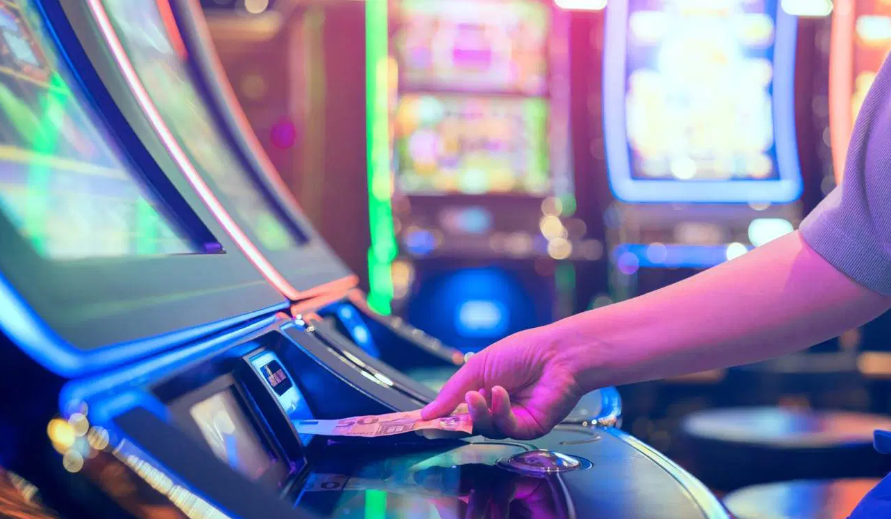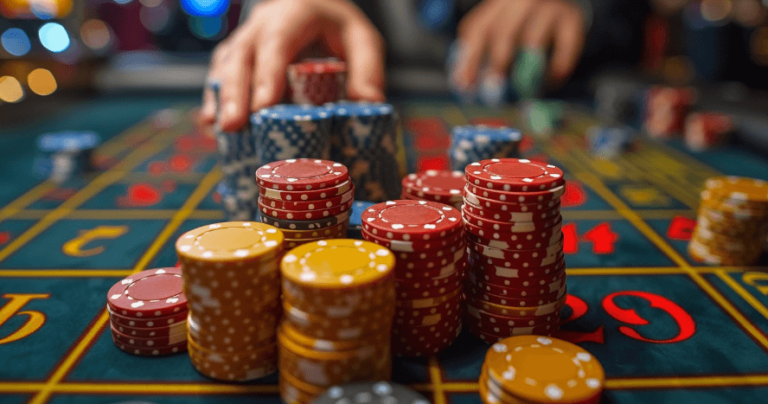The Psychology Behind Slot Machines: Why We Love Playing Pokies

Slot machines, or pokies as they are known in some parts of the world, have been a staple in casinos for decades. With their flashy lights, engaging sound effects, and the simple yet tantalizing promise of winning big, it’s no wonder that millions of people across the globe are drawn to them. But what is it about these machines that makes them so addictive and appealing? The psychology behind slot machines goes much deeper than just the design of the game. It’s a combination of human instincts, the power of reward, and the thrill of unpredictability.
In this article, we’ll explore the underlying psychological mechanisms that explain why people love playing pokies. By examining topics like variable reinforcement, the illusion of control, and the role of dopamine, we will uncover the science behind why slot machines can be so irresistible.
Introduction to Slot Machines
Slot machines, commonly known as pokies in Australia, are one of the most popular and accessible forms of gambling around the world. Their allure is undeniable, attracting millions of players annually. These machines are often designed to be engaging, easy to play, and capable of delivering high emotional highs (when you win) and lows (when you lose). But behind the colorful flashing lights and sounds, there’s a carefully constructed design aimed at keeping players engaged. To understand why we are so drawn to these machines, we must delve into the psychology behind their design and the powerful mental triggers they employ.
The Allure of Slot Machines
Why Are Slot Machines So Attractive?
Slot machines are designed to be simple yet captivating. The rules are straightforward, and players can start playing almost immediately without requiring any special skills or knowledge. Unlike table games like blackjack or poker, where strategy plays a role, slots are based purely on chance. This simplicity is part of their appeal. Players can experience excitement with little effort, making them an easy choice for those looking for a quick thrill.
The Role of Lights, Sounds, and Visual Stimuli
One of the key factors contributing to the allure of slot machines is their sensory stimulation. The lights, sounds, and vibrant visuals are deliberately crafted to attract and hold attention. Flashing lights and energetic sound effects trigger excitement and anticipation, while the sounds of coins clinking and reels spinning mimic the illusion of action and reward. These stimuli are designed to reinforce the player’s engagement, creating an immersive environment where the brain associates the sensory overload with excitement and reward.
The Reward System and Dopamine
The Brain’s Response to Rewards in Slot Machines
One of the primary psychological forces at work when playing pokies is the brain’s reward system, especially the release of dopamine. Dopamine is a neurotransmitter responsible for pleasure, motivation, and reinforcement. When you win, your brain releases dopamine, reinforcing the behavior and encouraging you to play again. This reward cycle becomes deeply ingrained, and over time, it can make playing pokies feel highly satisfying and even addictive.
Understanding Variable Reward Schedules
Slot machines utilize what is known as a “variable reward schedule.” This means that players do not know when they will win or how much they will win, which is a crucial part of what makes them so addictive. This uncertainty creates a sense of suspense and keeps players on edge. The sporadic nature of rewards—where a win might come after several losses—makes each spin feel potentially rewarding. The unpredictability of when the next payout will happen keeps players engaged, even when they’re not winning frequently.
The Illusion of Control
Why We Feel We Can Influence the Outcome of the Game
Despite knowing that slot machines are games of chance, players often believe they can influence the outcome. This feeling of control is a psychological phenomenon known as the “illusion of control.” In fact, many players engage in ritualistic behaviors—such as pressing the button in a certain way or at a specific time—believing that these actions can affect the outcome. This belief, though unfounded, provides players with a sense of agency and contributes to the overall appeal of the game.
Gamblers’ Fallacy and Cognitive Biases
The gambler’s fallacy is another cognitive bias that impacts slot machine players. This fallacy is the belief that after a series of losses, a win is “due” or inevitable. While each spin on a slot machine is independent of previous spins, the belief in patterns and streaks leads many players to continue playing, hoping for a win that is statistically unlikely.
Escapism and Entertainment
The Role of Entertainment in Slot Machine Play
For many people, slot machines offer more than just the possibility of winning money—they provide an escape from reality. The flashing lights, sounds, and excitement create a sensory experience that allows players to lose themselves in the game. This type of escapism can be particularly appealing for individuals looking to forget about their worries or stresses for a short period.
Why Slot Machines Offer an Escape
The feeling of being transported to a world of excitement and potential rewards can provide psychological relief. In a casino setting, players are often surrounded by other people, and the atmosphere is designed to amplify feelings of anticipation and thrill. For those seeking a break from everyday life, playing slots offers a temporary sense of freedom and release.
The Social Aspect of Slot Machines
Do We Play Slot Machines for Social Reasons?
Though slot machines are often seen as solitary games, they can have a social element. In casinos, players can watch others win or lose, and many people enjoy discussing strategies or experiences with fellow gamblers. In some cases, slot machine play can become a social activity, with friends or family members bonding over a shared experience.
Peer Influence and Group Dynamics
Peer influence plays a role in why some people enjoy playing pokies. If friends or family are also engaged in the game, individuals are more likely to join in. The social environment of a casino or a shared online gaming experience can make slot machine play feel like a group activity, further reinforcing its appeal.
The Role of Near Misses
How Near Misses Keep Players Coming Back
A critical factor in why people continue playing slot machines, even after a series of losses, is the “near miss” effect. When a player spins and almost hits the jackpot—missing by only one or two symbols—it creates the illusion of being “close” to winning. This near miss, though not a win, triggers the brain’s reward system in much the same way that a win would. The player experiences excitement and a desire to try again, believing that a win is just around the corner.
The Impact of Near Misses on Slot Machine Players
Near misses can be psychologically powerful. While they do not represent a win, they serve to reinforce the player’s belief that they can win and keep them coming back for more. The brain’s response to these near misses is akin to the pleasure associated with actual rewards, making them one of the most effective tools used in slot machine design to maintain player engagement.
The Influence of Technology
How Online Slots and Mobile Apps Have Changed the Game
In recent years, technological advances have further enhanced the appeal of slot machines. Online slots and mobile apps have made it easier than ever to play, with many games offering a similar sensory experience to traditional machines. These digital versions allow players to enjoy the thrill of slot machines from the comfort of their homes, with even more features, such as bonuses and jackpots, further enhancing the experience.
Why People Love Playing Pokies Online
The convenience of playing pokies online has made them even more popular. Players can access games anytime, anywhere, making it easy to become immersed in the experience without leaving home. Online slots also offer a wide variety of themes and bonus features, keeping the experience fresh and exciting.
Conclusion
The psychology behind slot machines is a complex mix of brain chemistry, cognitive biases, and environmental factors. The combination of sensory stimulation, variable rewards, and the illusion of control makes these games highly appealing. Slot machines offer a form of entertainment that taps into our innate desire for reward, excitement, and unpredictability. Understanding the psychological mechanisms at play can help us appreciate the intricate design behind pokies and also caution us about their potential for addictive behavior. Whether it’s the thrill of the spin, the near-miss excitement, or the promise of a big win, the psychology behind slot machines reveals why they are so beloved by many and so challenging to resist.
FAQs
1. Why do people find slot machines so addictive?
Slot machines are addictive because they trigger the brain’s reward system through variable reinforcement and the release of dopamine. The unpredictability of wins and near misses keeps players engaged.
2. What is the role of near misses in slot machine play?
Near misses create the illusion of being close to winning, which reinforces the player’s desire to continue playing, despite not actually winning.
3. How does the illusion of control affect players?
Players often believe they can influence the outcome of a slot machine, even though the results are random. This feeling of control can make the game more enjoyable and lead to prolonged play.
4. What is the gambler’s fallacy?
The gambler’s fallacy is the belief that after a series of losses, a win is “due.” This cognitive bias can lead players to continue gambling despite the odds being unchanged.
5. Why do slot machines use bright lights and sounds?
Bright lights and sounds are designed to attract attention and increase excitement. These sensory stimuli enhance the player’s engagement with the game and reinforce positive feelings when playing.
6. How do online slots differ from traditional machines?
Online slots offer greater accessibility, more themes, and innovative features such as bonuses and jackpots, making them more convenient and appealing to players.

